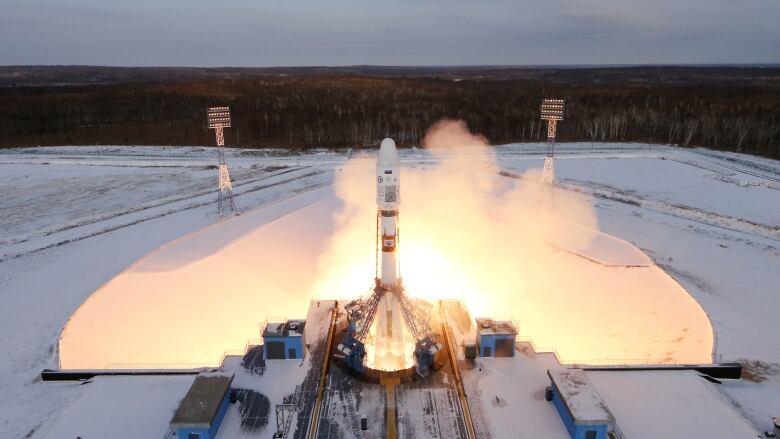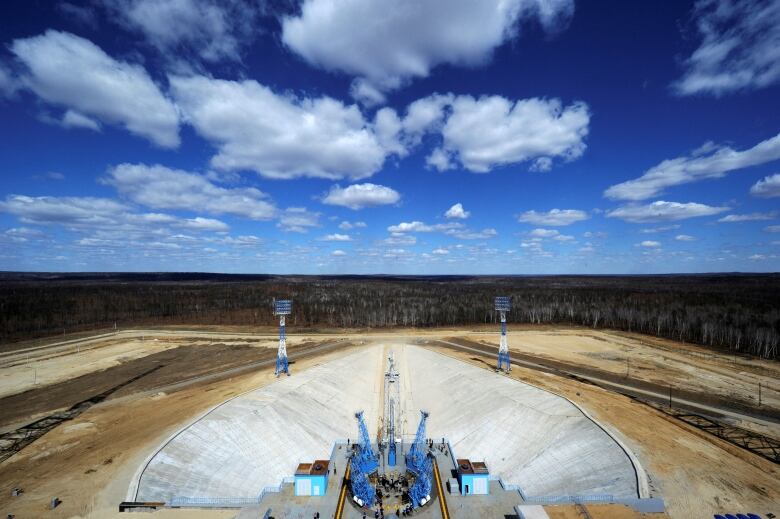Canadian satellite lost after Russian rocket fails during launch
Ottawa-based Telesat's newest communications test satellite among those lost

A Russian weather satellite and nearly 20 micro-satellites from various nations, including Canada,failed to enter their designated orbits Tuesday following the launch from Russia's new cosmodrome, another blow to the nation's space program.
The Roscosmos space agency said it has failed to establish communications with the Meteor M 2-1 satellite that was launched atop a Soyuz-2 booster rocket Tuesday from Russia's new Vostochny launch pad in the Far East. The agency says it's trying to determine what happened.
Russian news agencies reported the likely cause was the failure of the booster's final stage, the Fregat, possibly caused by a software flaw.
The booster also carried 18 micro satellites built in Canada, Germany, Japan, Norway, Russia, Sweden and the United States.

Among them was the LEO Vantage 2 satellite from Ottawa-based Telesat. The satellitewas built by Space Systems Loral in Palo Alto, Calif., and the University of Toronto Institute for Aerospace Studies Space Flight Laboratory.
Following the launch mishap Tuesday,Telesatconfirmed the loss of the satellite, butsaid in a statement thatits plans "remain on track."
It added that a second LEO test satellite will be launched in coming weeks aboard the Indian Space Research Organisation's Polar Satellite Launch Vehicle fromISRO'sSriharikotalaunch site.ISROsays its nextPSLVlaunchis scheduled for the second half of December.
It's the first test satellite of a constellation of 120that Telesat aims to have running in 2021, providing "fiber-like broadband" worldwide to commercial and government markets, the company said in a release earlier this month. And itslaunch was described as a "key step" in reaching the company's goal.
The company planned to use the test satellite to ensure its motion could be properly tracked from ground stations and it could be pointedthe right way to send and receive signals from Earth. It also planned to test the speed and quality of the satellite's broadband communications, and had hoped to open testing to customers in 2018.
Satellites stranded?
It wasn't immediately clear if the Meteor and other satellites fell into the ocean or were stranded in low orbit.
The glitch follows other failed launches in recent years that tarnished the reputation of Russian space industries. Some of the glitches were traced to manufacturing flaws.
Asked about the failed launch, President Vladimir Putin's spokesman Dmitry Peskov refrained from immediate comment, saying that the Kremlin was expecting space officials' report on the situation.
The failed launch is the second since the Vostochny cosmodrome made its debut in April 2016.

Russia spent billions of dollars to build the new launch pad as a possible alternative to the Baikonur cosmodrome in Kazakhstan that Moscow has leased from its former Soviet neighbour.
Some observers have disputed the feasibility of the expensive new facility, given the fact that Russia plans to continue using Baikonur for most of its launches. Construction work at Vostochny has been dogged by scandals involving protests by unpaid workers and the arrests of officials accused of embezzlement.
With files from CBC News













_(720p).jpg)


 OFFICIAL HD MUSIC VIDEO.jpg)
.jpg)



























































































